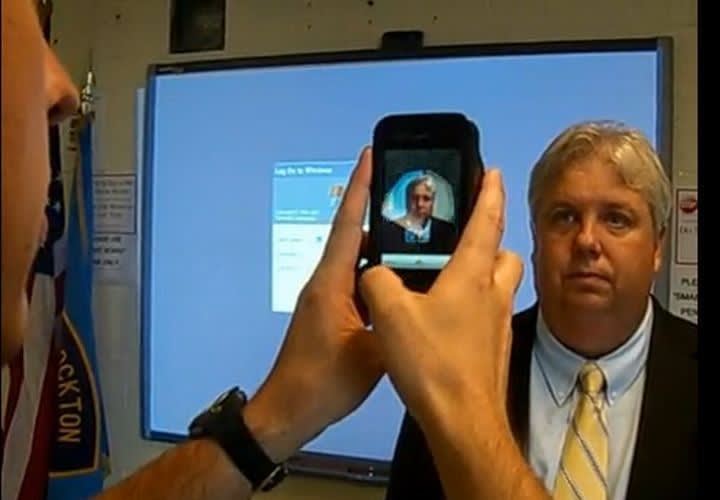Until now, Apple's iPhone has been a device to check your e-mail, update your Facebook status or go head-to-head with "Jimmy" in Texas Hold 'Em in a swanky Paris back room, while waiting for your flight.
Now, it looks like the world's coolest smartphone may actually serve you as a tool for police work.
Two agencies in Massachusetts—the Plymouth County Sheriff's Department and Broxton PD—have begun training their officers with a modified iPhone that includes biometric software, allowing the phone to capture iris, facial and fingerprint data.
The phone has the capabilty to capture the data, as well as enable an officer to search a database to match it up with a suspect.
Here's how it works:
An officer establishes probable cause and stops a suspect to ask for identification. In addition to asking for a driver's license, the officer would use the iPhone to photograph the suspect's face and iris (the colored ring around the pupil).
Since each person's face in unique, facial recognition can be a valuable identifier. It measures the relationship between the unique features (eyes, nose, mouth, etc.) to one another.
The phone would then use that data to search a regional database for a match. It would allow officers to verify a suspect's identification and perhaps avoid dragging them back to the station.
As you may guess, the American Civil Liberties Union of Massachusetts has questions about this initiative.
"What kind of pictures will be in this database? Is it the RMV photos? Is it the photos of the prisoners when they are booked? What exactly will this database be?" Laura Rotolo, the ACLU's staff attorney, told EnterpriseNews.com. "We are concerned that they are going to be taking pictures of innocent civilians."
The system isn't cheap. Because the phone is heavily modified, it carries a steep price tag: $3,000. The device and software system, called MORIS (Mobile Offender Recognition and Identification System), have been made available due to a grant via the Massachusetts Sheriff's Association, the Patriot Ledger reports.
The devices will be available to officers in the coming months. Iris recognition isn't available yet, but would be added in the future. Suspects would look into a binocular-type device to have their irises scanned.
Other agencies are lining up to use the system, at least in Massachusetts. Of the $200,000 federal grant, about $148,300 of that grant will bring the system to an additional 28 police departments and 14 sheriff departments in the state.
To hear from the LEOs implementing it, watch this video.












